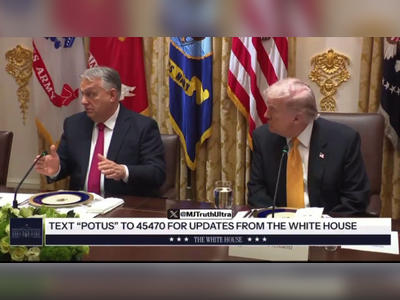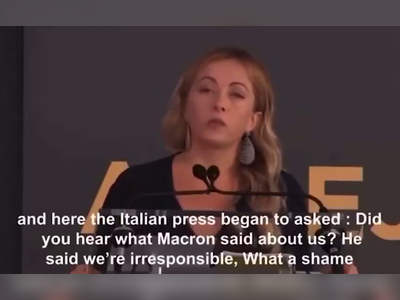
Elon Musk Ends Government Role Amid Criticism of Spending Bill
The billionaire's departure from a special government position follows his unprecedented critique of former ally Donald Trump's economic legislation.
Elon Musk, the billionaire entrepreneur known for his leadership of Tesla and SpaceX, has confirmed that he will conclude his role aimed at reducing public expenditure.
This announcement comes after a four-month stint as a special government employee, during which he promoted fiscal efficiency initiatives.
In a post on social media platform X, Musk expressed gratitude to President Donald Trump for the opportunity he was given to tackle unnecessary spending.
Musk referred to his initiative, dubbed the 'Doge Mission', as one that will continue to strengthen in the future, aspiring to embed cost-cutting measures into the government’s operational ethos.
However, in an interview with CBS, which is set to air in full on Sunday, Musk expressed disappointment over a significant spending bill that he believes will exacerbate the federal deficit.
While discussing the 'grand and beautiful legislation,' a reference to Trump's major economic bill currently under congressional review, Musk stated that he found the proposal troubling.
According to a politically neutral agency's analysis, the legislation could result in an increase of approximately $3.8 trillion to the federal deficit over the next decade, mainly due to extended tax incentives.
Musk articulated skepticism regarding the dual characterization of the legislation as both 'great' and 'beautiful', implying that such a combination may not be feasible.
This statement marks a public shift in Musk’s previously steadfast support for Trump, particularly noted during Trump's administration after his inauguration on January 20.
Elon Musk and Donald Trump’s relationship has been closely observed, especially as Musk played a significant role in funding Trump’s campaign.
Their partnership was prominent in various settings, including White House events and discussions concerning significant policy shifts, such as the reduction of international aid and major federal staffing cuts.
Despite the initial tight alliance, reports surfaced of tensions between Musk and certain cabinet members.
Some officials reportedly found Musk's methods abrasive.
His appointment was officially intended to be limited in duration, with his position capped at 130 days as a special government employee.
In late April, Musk announced that he would step back from government affairs to focus more on his companies like Tesla, which has faced declining sales amid increasing scrutiny of Musk's influence and public persona.
Recently, after a brief outage of the X platform, Musk mentioned his return to a rigorous work schedule, emphasizing his dedication to his ventures.
The intersection of Musk's business interests with federal operations has raised concerns regarding potential conflicts of interest, given the substantial contracts between the government and his companies and the implications of regulations affecting those industries.
This announcement comes after a four-month stint as a special government employee, during which he promoted fiscal efficiency initiatives.
In a post on social media platform X, Musk expressed gratitude to President Donald Trump for the opportunity he was given to tackle unnecessary spending.
Musk referred to his initiative, dubbed the 'Doge Mission', as one that will continue to strengthen in the future, aspiring to embed cost-cutting measures into the government’s operational ethos.
However, in an interview with CBS, which is set to air in full on Sunday, Musk expressed disappointment over a significant spending bill that he believes will exacerbate the federal deficit.
While discussing the 'grand and beautiful legislation,' a reference to Trump's major economic bill currently under congressional review, Musk stated that he found the proposal troubling.
According to a politically neutral agency's analysis, the legislation could result in an increase of approximately $3.8 trillion to the federal deficit over the next decade, mainly due to extended tax incentives.
Musk articulated skepticism regarding the dual characterization of the legislation as both 'great' and 'beautiful', implying that such a combination may not be feasible.
This statement marks a public shift in Musk’s previously steadfast support for Trump, particularly noted during Trump's administration after his inauguration on January 20.
Elon Musk and Donald Trump’s relationship has been closely observed, especially as Musk played a significant role in funding Trump’s campaign.
Their partnership was prominent in various settings, including White House events and discussions concerning significant policy shifts, such as the reduction of international aid and major federal staffing cuts.
Despite the initial tight alliance, reports surfaced of tensions between Musk and certain cabinet members.
Some officials reportedly found Musk's methods abrasive.
His appointment was officially intended to be limited in duration, with his position capped at 130 days as a special government employee.
In late April, Musk announced that he would step back from government affairs to focus more on his companies like Tesla, which has faced declining sales amid increasing scrutiny of Musk's influence and public persona.
Recently, after a brief outage of the X platform, Musk mentioned his return to a rigorous work schedule, emphasizing his dedication to his ventures.
The intersection of Musk's business interests with federal operations has raised concerns regarding potential conflicts of interest, given the substantial contracts between the government and his companies and the implications of regulations affecting those industries.









